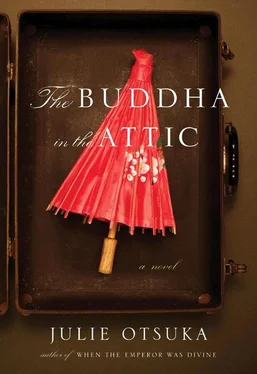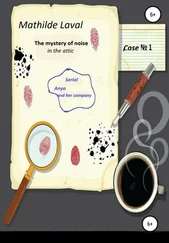FROM TIME TO TIME one of their men would ask to have a word with us in his study while his wife was out shopping, and we did not know how to say no. “Is everything all right?” he would ask us. Usually we stared down at the floor and said yes, of course, everything was fine, even though this was not true, but when he touched us lightly on the shoulder and asked us if we were sure, we did not always turn away. “Nobody has to know,” he would say to us. Or, “She’s not due home until late.” And when he led us upstairs to the bedroom and laid us across the bed—the very same bed we had made up that morning—we wept because it had been so long since we’d been held.
SOME OF THEM asked us to speak a few words in Japanese for them just to hear the sound of our voice. It doesn’t matter what you say . Some of them asked us to put on our finest silk kimonos for them and walk slowly up and down their spines. Some of them asked us to tie them up with our flowered silk sashes and call them whatever names came to mind, and we were surprised at what those names were, and how easily they came to us, for we had never before said them out loud. Some of them asked us to tell them our real names, which they then whispered to us again and again until we no longer knew who we were. Midori. Midori. Midori . Some of them told us how beautiful we were, even though we knew we were homely and plain. No man would look at me in Japan . Some of them asked us how we liked it, or if they were hurting us, and if so were we enjoying the pain, and we said yes, for we were. At least when I’m with you I know I’m alive . Some of them lied to us. I’ve never done this before . And we, in turn, lied to them. Neither have I . Some of them gave us money, which we slipped into our stockings and gave to our husbands that same evening without saying a word. Some of them promised to leave their wives for us, even though we knew they never would. Some of them found out we were pregnant by them— My husband has not touched me in more than six months —and then sent us away. “You must get rid of it,” they said to us. They said, “I will pay for everything.” They said, “I will find you employment elsewhere at once.”
ONE OF US made the mistake of falling in love with him and still thinks of him night and day. One of us confessed everything to her husband, who beat her with a broomstick and then lay down and wept. One of us confessed everything to her husband, who divorced her and sent her back to her parents in Japan, where she now works in a silk-reeling mill in Nagano for ten hours a day. One of us confessed everything to her husband, who forgave her and then confessed to a few sins of his own. I have a second family up in Colusa . One of us said nothing to anyone and slowly lost her mind. One of us wrote home for advice to her mother, who always knew what to do, but never received a reply. I must cross this bridge by myself . One of us filled the sleeves of her white silk wedding kimono with stones and wandered out into the sea, and we still say a prayer for her every day.
A FEW OF US ended up servicing them exclusively in pink hotels above pool halls and liquor stores in the seedier parts of their towns. We shouted out to them from the second-story windows of the Tokyo House, where the youngest of us was barely ten years old. We gazed at them over the tops of our painted paper fans at the Yokohama House, and for the right price we did for them whatever their wives would not do for them at home. We introduced ourselves to them as Mistress Saki and Honorable Miss Cherry Blossom in high, girlish voices at the Aloha House, and when they asked us where we were from we smiled and said, “Oh, somewhere in Kyoto.” We danced with them at the New Eden Night Club and charged them fifty cents for every fifteen minutes of our time. And if they wanted to come upstairs with us we told them it was five dollars a go, or twenty dollars to keep the room until morning. And when they were finished with us we handed their money over to our bosses, who gambled nightly, and paid regular bribes to the police, and would not let us sleep with anyone of our own race. A pretty girl like you is worth a thousand pieces of gold .
SOMETIMES, while we were lying with them, we found ourselves longing for our husbands, from whom we had run away. Was he really so bad? So brutal? So dull? Sometimes we found ourselves falling in love with our bosses, who had kidnapped us at knifepoint as we were coming in from the fields. He brings me things. He talks to me. He lets me go for walks . Sometimes we convinced ourselves that after one year at the Eureka House we would have enough money to pay for our passage back home, but at the end of that year all we had was fifty cents and a bad dose of the clap. Next year , we told ourselves. Or maybe the year after that . But even the prettiest of us knew that our days were numbered, for in our line of work you were either finished or dead by the time you were twenty.
ONE OF THEM bought us out of the brothel where we worked and brought us home to a big house on a tree-lined street in Montecito, whose name we shall not reveal. There were hibiscus in the windows, marble tabletops, leather sofas, glass dishes filled with nuts for whenever the guests stopped by. There was a beloved white dog we named Shiro, after the dog we had left behind in Japan, and we walked her with pleasure three times a day. There was an electric icebox. A Gramophone. A Majestic radio. A Model T Ford in the driveway that we cranked up every Sunday and took out for a drive. There was a tiny maid named Consuelo, who came from the Philippines, and baked wonderful custards, and pies, and anticipated our every need. She knew when we were happy. She knew when we were sad. She knew when we’d fought the night before and when we’d had a good time. And for all of this we were forever grateful to our new husband, without whom we would still be working the streets. The moment I saw him I knew I’d been saved . But every now and then we’d find ourselves wondering about the man we had left behind. Did he burn all our things the day after we left him? Did he tear up our letters? Did he hate us? Did he miss us? Did he care whether we were dead or alive? Was he still working as a yardman for the Burnhams on Sutter Street? Had he put in their daffodils yet? Had he finished reseeding their lawn? Did he still eat his supper alone, every evening, in Mrs. Burnham’s great big kitchen, or had he finally made friends with Mrs. Burnham’s favorite Negro maid? Did he still read three pages from the Manual of Gardening every night before going to bed? Did he still dream of one day becoming majordomo? Sometimes, in the late afternoon, just as the light was beginning to fade, we took out his yellowing photograph from our trunk and looked at it one last time. But no matter how hard we tried we could not make ourselves throw it away.
A NUMBER OF US found ourselves hunched over their galvanized tin washtubs on our third day in America, quietly scrubbing their things: stained pillowcases and bed-sheets, soiled handkerchiefs, dirty collars, white lace slips so lovely we thought they should be worn over, and not under. We worked in basement laundries in Japantowns in the most run-down sections of their cities—San Francisco, Sacramento, Santa Barbara, L.A.—and every morning we rose before dawn with our husbands and we washed and we boiled and we scrubbed. And at night when we put down our brushes and climbed into bed we dreamed we were still washing, as we would every night for years. And even though we had not come all the way to America to live in a tiny, curtained-off room at the back of the Royal Hand Laundry, we knew we could not go home. If you come home , our fathers had written to us, you will disgrace the entire family. If you come home your younger sisters will never marry. If you come home no man will ever have you again . And so we stayed in J-town with our new husbands, and grew old before our time.
Читать дальше












